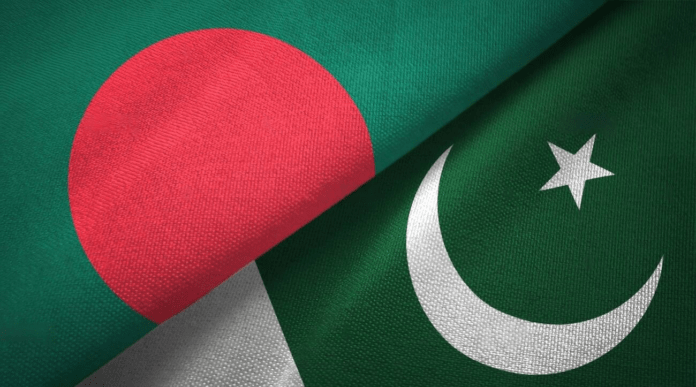The seminar, “Strengthening People-to-People Ties Between Pakistan and Bangladesh,” convened an esteemed panel of thought leaders, including the High Commissioner of Bangladesh to Pakistan, Muhammad Ruhul Alam Siddique, the Patron-in-Chief of the Karachi Council on Foreign Relations, Ikram Sehgal, and KCFR Chairperson, Ms. Nadira Panjwani. Through their insightful discourse, the speakers explored the pivotal role of cultural diplomacy, historical ties, and grassroots exchanges in fostering mutual understanding and shaping a more collaborative and harmonious relationship between the two neighboring nations.
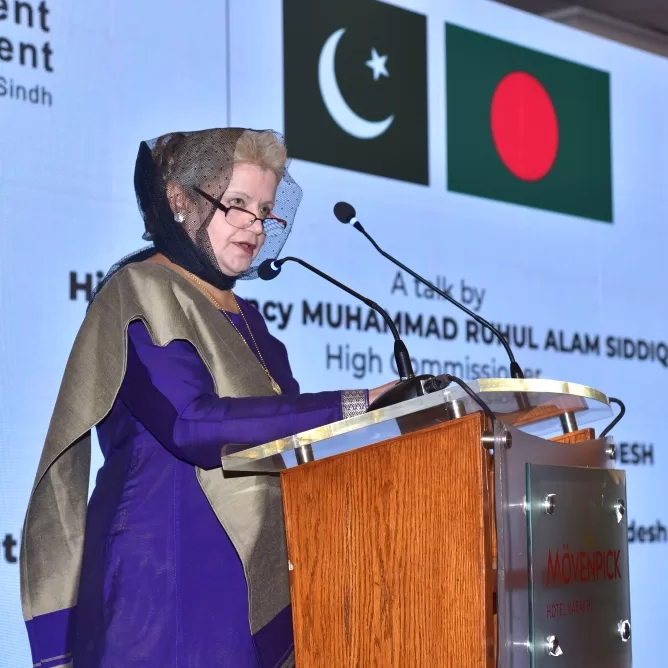
Nadra Panjwani Chairperson, KCFR
Excellency Muhammad Ruhul Alam Siddique, High Commissioner of People’s Republic of Bangladesh distinguished Members of the Diplomatic Community, Ladies & gentleman Assalam Alaikum & warm greetings. All of us at the Karachi Council on Foreign Relations are delighted to welcome Excellency High Commissioner of Bangladesh and all the esteemed guests here.
Our Council was established in the year 2003 by a group of eminent citizens of Karachi who hailed from different walks of life like the judiciary, Foreign Service, armed forces, business figures and academics. Our basic objective has always been to support our government’s efforts in promoting our national interests by facilitating constructive dialogue and engagement with the diplomatic community posted in Pakistan. We are, therefore, very grateful to High Commissioner Sahib for accepting our invitation and agreeing to address our Council.
Pakistan and Bangladesh established diplomatic relations in 1974. It has not been an easy relationship, the trauma of our separation, the historical grievances that led to this separation, the geo-political complexities and the regional hostilities in this part of the world, have all played a role in keeping our relations generally strained.
Looking at world history, we come across many examples of nations engaged in long term war and conflict who eventually made peace and moved forward. The European continent has had the highest number of interstate and intra state wars on record, but today, we see 27 European countries with several more in the queue, closely united politically and economically in the form of the European Union. Germany and France are now the two key members of the European Union, but during World War I and World War II they fought each other fiercely. In Asia, Japan and South Korea were adversaries in World War II, but now they are strong economic partners.
Similarly, the United States and Vietnam remained locked in war for almost 16 years but now, they are active trade and investment partners. History is replete with such examples and the take home lesson for us, is that there is nothing to be gained by remaining stuck in the past.
In the words of the iconic freedom fighter, Nelson Mandela, “Forgiveness liberates the soul, it removes fear and that’s why it is such a powerful weapon”. We have to forgive, we have to forget and we have to move forward.
It is said that trade is a disincentive to hostility and paves the way for peace. Going by this maxim, we must focus on the vast and untapped trade potential between our two countries. The idea of a Free Trade Agreement between Pakistan and Bangladesh was first proposed in 2002 but for various reasons it did not materialize. Our main exports to Bangladesh are cotton, salt, sulphur, cement, leather, plastics and food stuff. And our imports are mostly jute, textile fibres and fish. The total volume of our bilateral trade stood at 1.5 billion dollars last year. Looking at the size of population and markets on both sides, this level of trade can easily increase manifolds.
Challenges like high tariffs, red tape, tedious customs procedures, lack of direct connecting routes and difficult visa rules, need to be addressed on priority basis. Agriculture, pharmaceuticals and IT offer a lot of scope for mutually beneficial trade opportunities.
SAARC has remained a generally stagnant body since its birth in 1985, but if both Pakistan and Bangladesh resolve to make it an active and meaningful association, they can infuse some life in it. It was very encouraging to hear Dr Muhammad Younus expressing his resolve to revive SAARC which can help in promoting regional trade and cooperation.
As for our people-to-people relations, we follow the same religion and traditions, we have a shared cultur al heritage and we can easily build on this by fostering collaboration in education such as student exchange programs, literature festivals, cultural exchanges, joint film productions and music festivals. Celebrated Bangladeshi artists like Shehnaz Begum, Shabnam and Runa Laila are still much loved and cherished in Pakistan. Tourism is another area where we can strengthen our bonds, there are many religious sites and Sufi shrines in Pakistan that can attract tourists from Bangladesh.
Similarly, there are many historic mosques there for us to visit like the famous Sixty Dome Mosque, which is a UNESCO heritage site, the iconic Tara Masjid of Dhaka, and the famous Sufi saint Shah Jalal’s Mosque in Sylhet. And then of course, there is cricket, another shared passion which generates so much interest among our people. Bilateral Cricket series can brin us closer.
Ladies and gentlemen, the Monsoon Revolution of this August in Bangladesh has presented us the opportunity to set aside differences of the past and resolve to move forward with sincerity and commitment. Let us together, write a new chapter of peace, progress and prosperity for our people.
Excellency, I thank you again for honouring us with your presence today. Ladies and Gentlemen, thank you very much.
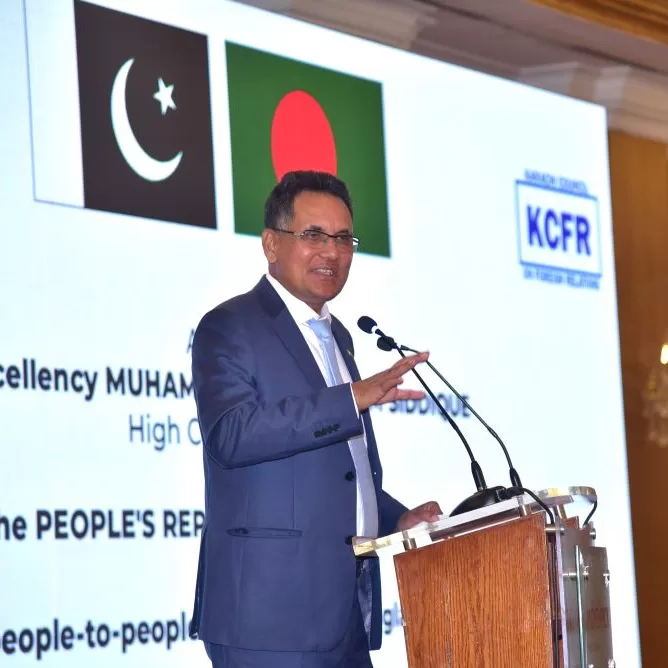
Muhammad Ruhul Alam Siddique, High Commissioner of Bangladesh to Pakistan
I’m really humbled and honored to be here and looking at this august gathering but I’m also not very comfortable speaking in front of some stalwarts here. Ikram Sehgal, the Chairperson KCFR, Ambassador Jamal Siddiqui, you know that there are all Siddiquis in Dhaka and in Islamabad. I can see lot of faces, Iqbal Chaudhry is here he’s a real good friend of mine. I know this country, I know its people and I’m given this difficult job to talk about people to people contact.
The beginning four five years of the last regime were really one of the best time for bilateral relationship. Pakistan has always been a very important country and important source of our raw material for our textile industry. We used to import cotton but these days Pakistan doesn’t produce enough cotton to sell to us so we import yarn fabric and other textile raw materials for our industry. Second item we import mostly is light engineering equipment like fans and other things.
Pakistan has been always there for us to turn to when we have scarcity of some food items and we used to import wheat and flour now we don’t because Pakistan doesn’t have enough wheat to sell to us but I’m still trying to get some wheat as a friendly gesture from Pakistan because we used to import wheat mostly from Russia and Ukraine and as the two countries are at war it has become a serious problem. All of you know that we have a good amount of investment from Pakistan.
Not only in the textile Industry, there are few more Industries in which Pakistan has invested in Bangladesh in areas where even the Bangladeshi business people don’t think of investing. Like one of the industry, that is in Nilfamari Export Processing Zone, which is at the far north corner of Bangladesh. So I asked the gentleman, is he happy with this industry? He said yes. He has been producing starch from potato and the he can buy potato at almost throw away price during the season and he never had any electricity supply problem or anything. He was very happy with his small industry in Nilfamari. Many of you know that it is the northernmost District of Bangladesh and he was happy with that and you know that some people were not happy thinking that investment from Pakistan that went to Bangladesh and would come back.
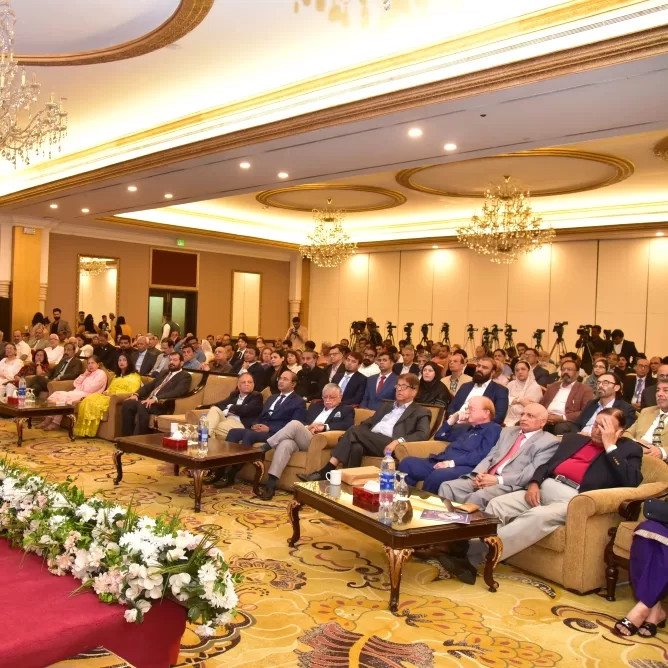
These Industries had to maintain their supply chain with their buyers in Europe as well as in North America at the same time, to get this special facilities from LDC of Bangladesh. So they shifted some of their production line to Bangladesh, but not the entire industry they relocated. It was to maintain their supply chain to their buyers and I remember clearly that I used to issue a lot of visas to the business people for their meetings with their buyers in Dhaka. Because in those days, the Western and European buyers were not comfortable coming to Pakistan given the law and order situation at the time. So that was kind of facilitating business of Pakistan. In fact in those days, some of the Pakistani manufacturers were resorting in Bangladesh for maintaining their International businesses.
I remember that until 2014 it happened, and then it started to go down and down and down. That was the time when we had good business relationship and that should be revived. Certainly visa issue is a factor but I’ll come to that later. I think there are other issues too. We must also clear our perception about both of us and as I said, there wasn’t any trade dispute during my tenure, mainly because most of the business people in Pakistan were sharing their connections with Bangladesh. Either they lived there in their childhood or they have a friend or family back in Bangladesh. So it’s very easy to do business with Bangladesh because one can pick up the phone and just talk to a very close friend and learn from him or get to know things about doing business in Bangladesh. I don’t have any job to do there. I’m not really a catalyst. I can only do one thing, that is, I can facilitate the visa for people going there. This is our advantage, this is the strength we have in our relationship. About educational ties, we have been giving 20 visas for medical students every year and two dental students in Bangladesh. This has been going on without any Interruption.
At the moment, we have good number of Pakistani doctors educated in Bangladesh. I have established a network with these doctors. Unfortunately I don’t know why in the last government, there was a Parliamentary Secretary from the Ministry of Health in Pakistan, who asked me why there is no participation from Sindh and Karachi in this scholarship program. I said, I really don’t know because we contact the Higher Education Council and then they select the students, so we don’t have any anything to do with it. But as a matter of fact, there has not been any participation from Sindh and Karachi in that scholarship program, but mostly from Punjab, South Punjab and Khyber-Pakhtunkhwa.
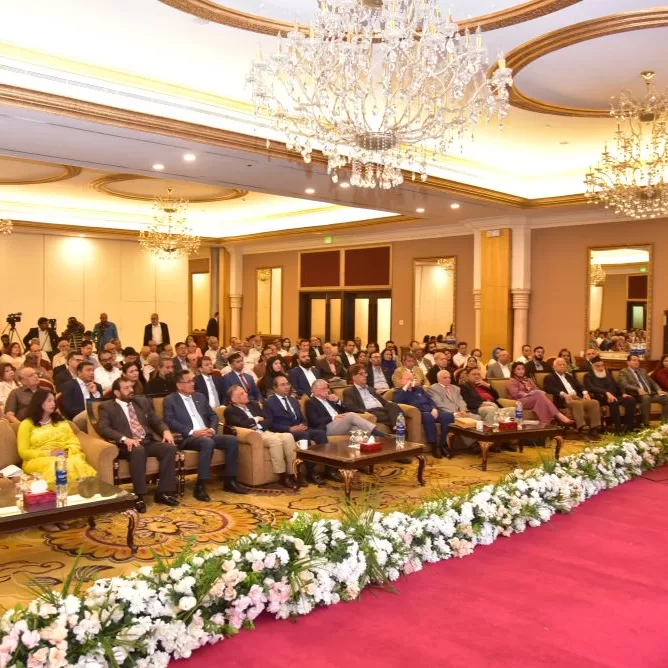
We have been giving these 20 scholarships to Pakistani students and there was no scholarships for Bangladeshi students coming to Pakistan for some time. But I have good news to share with you, that in the last Academic Year, there was an offer for three students and we requested for three more so we have six students coming on technical assistance program to Pakistan for studies. There are a good number of students coming from Bangladesh and going to Pakistan. I see one difficulty that is there, some complication in renewal of their visa or something like that.
We are trying to address from our end, whatever can be done. But what is missing completely, I would say, is the institutional level collaboration among the academia. There are personal level interactions between the academia but the institutional level collaboration has not been there. There has not been training of the educational institutions or any collaboration. A MOU was signed between Bangladesh Agricultural Research and Institute, we call it BAR, and Pakistan Agricultural Research Institute PAR.
Unfortunately, that was put in the freezer for some time. Recently, we have renewed it for 10 years. These two institutions will be working again together to collaborate in the agriculture sector. Cultural exchanges are almost not there. We are still having some Pakistani singers going to Bangladesh and performing there. There used to be a regular Folk Festival in Dhaka and generally in the Folk festival, at least one singer from Pakistan is always there and a topnotch one. Lately, it has not been happening and I’m sure that it will revive. We were discussing last night about this, about Bangladeshi singers who are quite popular. Amina was proposing that can we bring Runa Laila to Pakistan, who is closely related to because her elder sister is married to one of the families in Sindh. She also would like to come, but you know that she is such a superstar. It’s very difficult for the High Commission to organize her program here. It has to be at a private level initiative.
So if any private level initiative is taken, I think that would be better initiative to bring these singers to Pakistan from Bangladesh. Also, Joint collaboration in film making and other television programs is needed. When I was in Karachi, Sultana Siddiqui, the chairperson of HUM TV, wanted to start Masala Television channel in Bangladesh. We have news channels, we have entertainment channels in Bangladesh but there is no cooking channel. At that time, this didn’t materialized. The reason for her to be looking at Bangladesh is that, she used to work with PTV and she had lot of colleagues from East Pakistan who are her friends. So she wanted to introduce MASALA TV at that time and that’s how I came to know her and then we became very close.
I can share one experience, when I went on holiday to Bangladesh, I was invited by someone and interestingly the Indian High Commissioner to Bangladesh was also there and a young girl aged 14 or 15, the daughter of the host and in the face of Indian High Commissioner she said that she doesn’t like Indian drama serials but she watches Pakistani drama serials. So, I can tell you for sure that Pakistani drama serials are getting increasingly popular in Bangladesh.
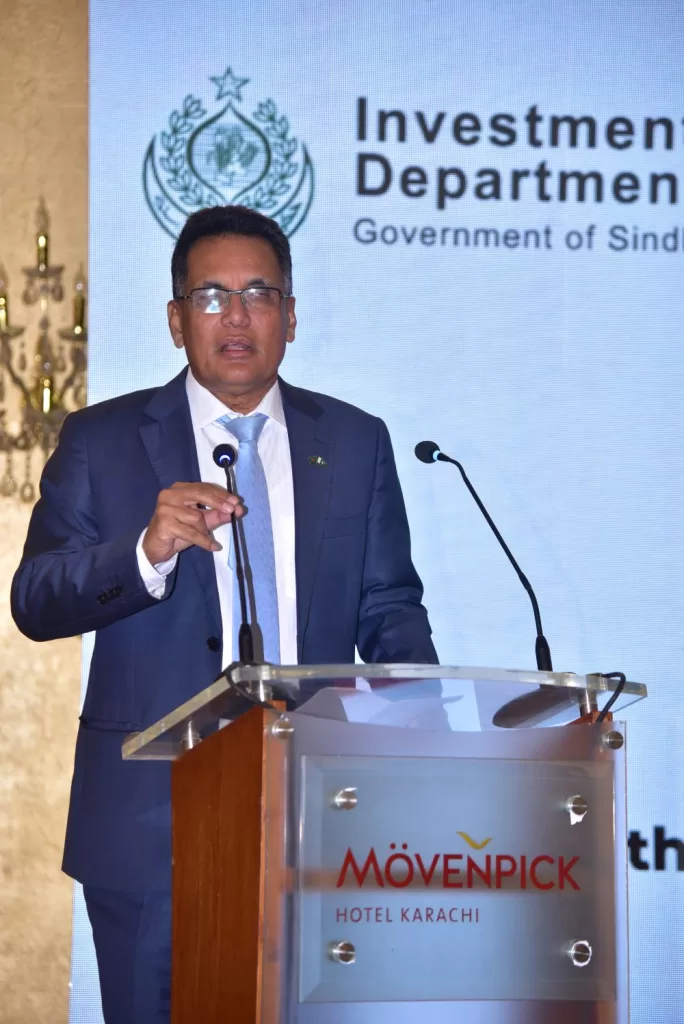
We have Cricket, we have drama serials, we have family linkages, we have other linkages but this exchange of cultural groups or cultural teams have not been taking place at the government level. We must also do that and this will certainly have new impact in our bilateral relationship, particularly in increasing people to people contact. We have been discussing about Alamgir the singer, who is a Bengali and who become the most popular singer in the 80s in Bangladesh because he was the one who introduced Fusion in folk songs and popularized the common folk songs in Bangladesh so much. This kind of the things are already there, but we must also have exchange of cultural delegations between our two countries. Defense ties is one area where we never had any difficulty and the relationship is still going upwards. These are the two institutions that have their own channels. General Moeen Haider would also help me in this regard. I have a good news to share with you. I’m sharing these small improvements in the relationship which has only recently taken place. It wan’t there for some time. After 11 long years, a National Defence College (NDC) delegation as part of their training, visited Pakistan this year. My brother Ikram Sehgal used to lecture in Dhaka at the NDC, this has been some time isn’t it? It was in the beginning and even before the regime change is started. So the opportunity is there. We must seize the opportunity. About Defense relation, I was playing golf with the Naval Chief of Pakistan, we had 2 and a half hours to walk together and after one hour he asked me that the last minute cancelling of the visit of a ship to Karachi Port was serious and a difficult thing for us. I didn’t have any answer to his question.
The last ship called in Karachi Port was in 2012. It participated in AMAN 1 or 2, I forget the name. But we must also encourage this, our naval ships calling at each other’s ports or having joint exercises. Many other exchange of delegations were in the cards before the regime change.I can share one interesting information that the present Chairman Joint Chief of Staff of Pakistan had one training in Dhaka in Bangladesh. So this defense collaboration is there. We are also procuring some defense material, non-combatant material from Pakistan.
About community engagement, Madam Chairperson would be the right person I met and the water expert I met this morning. I was not aware of that we have this kind of institution and we have NGOs.
Two major Bangladeshi NGOs used to work in Pakistan, one in the development sector that was BRAC, Bangladesh Rural Advancement Corporation and the second was ASHA, working in micro Finance/ micro credit. I think for some reason, it was decided that no International NGO should work in Pakistan, so both the NGO’s were asked to leave. BRAC, wound up their program and went back, but ASHA, left the program ongoing in the hands of their Pakistani friends.
So ASHA is still working through the Pakistani people, but the Bangladeshi staff are no longer here. We are quite successful in micro finance and everybody here knows about it and it is the Mastermind of Professor Yunus who is our Chief Advisor now. So this is one aspect, but in other Social Development, the success story of Bangladesh was not purely on the government side it was supported by the NGO activities.
So BRAC was running some informal primary schools here for four classes and that those are very popular schools. I visited some of them and they were also working on sanitation and other areas. So this collaboration in the non-governmental research organization can be another area of connectivity. Youth and sports, the last revolution and most recent one was spearheaded by the students and the young generation in Bangladesh.
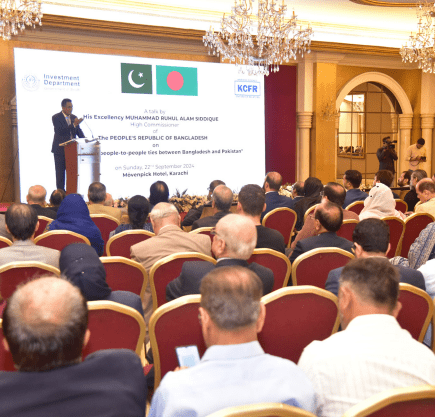
I generally talk about this huge young population in our two countries, they are our biggest strength. This is also the biggest asset of our two countries, if we can bring them together and we can take the benefits of this young generation of our two countries then certainly it will have a huge impact on our bilateral relationship. Particularly we can learn from each other’s good practices. I must share with you that Pakistan has been a strong supporter for the development of our cricket which also comes under part, Youth and Sports.
So we have this collaboration. But because of some limitations and some visa procedure, some of these initiatives could not be materialized. Being the two major Muslim majority population countries, we have another very strong common faith which can be very useful. We have one platform where this interaction has been there without any hindrance, which is this annual congregation of Tableegh Jamaat in Bangladesh. Their exchanges are going on and we generally issue them visa on priority basis. My Deputy High Commissioner was informing me about it so it is there. But there must be other collaborations too, but we have to be careful about these exchanges that we don’t facilitate, unwanted elements to influence our belief and faith. Then about tourism and traveling. Traveling is a real challenge now from both the sides. The strongest pressure I have on me since the change in regime in Bangladesh on August 5th, is about the direct flights between Dhaka and Karachi. I mean I’ve been asked by my people who are here in Pakistan and also people in Bangladesh who want to visit Pakistan that we must have this direct flight to commence between these two countries. Because the price of air ticket is unusually high these days, and I’m also the one suffering of not having direct flights between the two countries.
So Pakistan’s High Commissioner in Dhaka already had a meeting with a private Airline. The airline people came to see him in his office and I’m quite sure this will be the one of the priority issues to address. And about the direct flights, the number of people going and coming from the two countries will certainly increase. One interesting aspect which is cross border marriage. I mean you people may think that I’m not talking sense but it is there.
A good number of our children are getting married neither in Pakistan nor in Bangladesh, but in a third country and the difficulty I’m facing is issuance of visa. Even one Senator called me from Sindh that his brother is getting married to a Bangladeshi girl in the US and I said ma’am no problem I’ll issue the visa, you can go from here to Bangladesh easily. But I’m not sure that your brother will get visa from the US to go to Bangladesh to get married and eventually it couldn’t happen because the brother couldn’t get the visa.
I’m giving this example because Visa was a serious embarrassment for me when suddenly in August 2013 suddenly it was completely closed and no visa would be issued. We had High Commissioner Yasmin in Islamabad and her mother used to come to my residence for events. During a New Year celebration in my residence in Karachi she came to the celebration and when I was walking her back to her car she held my hands and said “you won’t give me the VISA too?” What could be my answer?
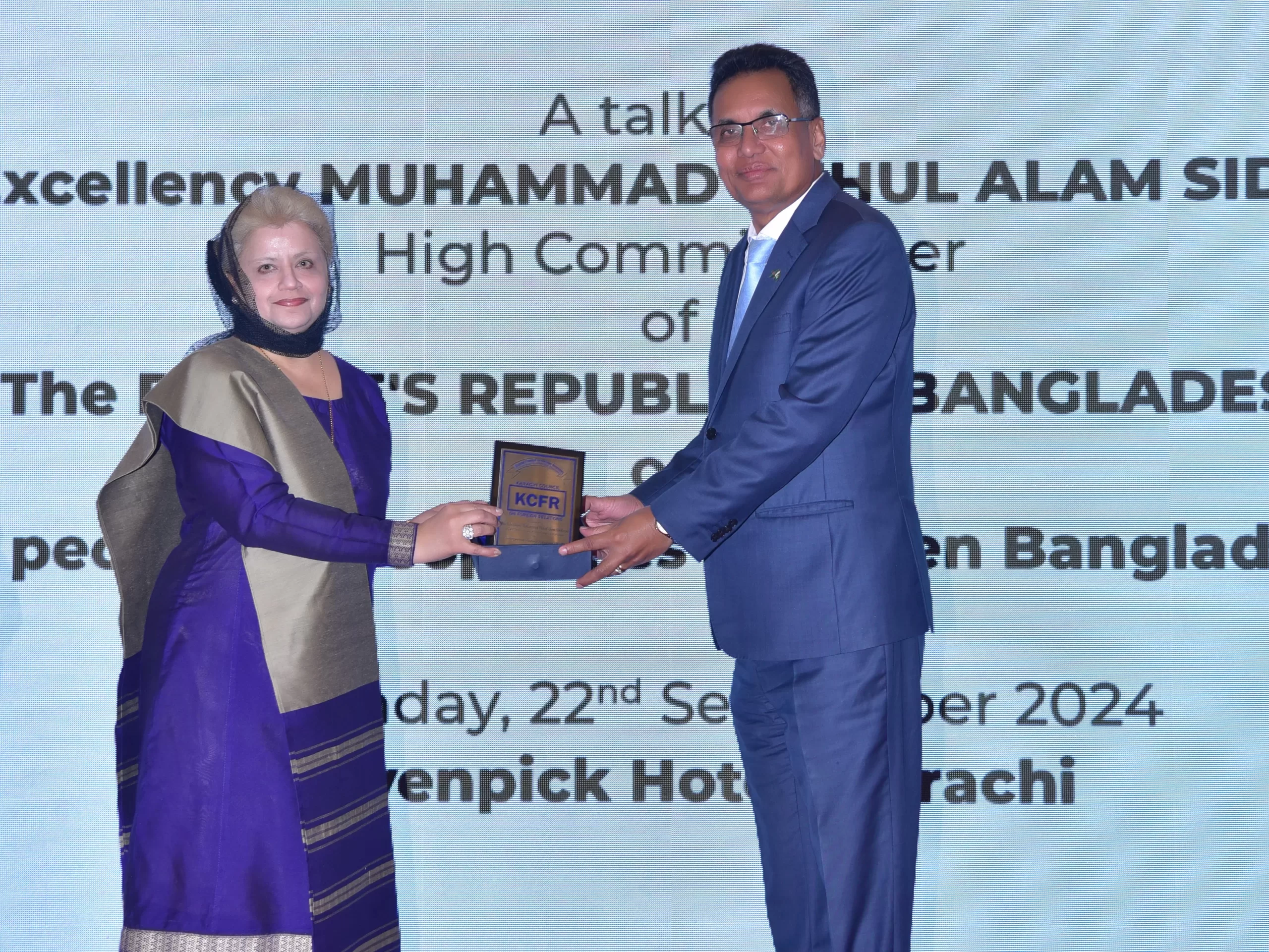
Then there was a newlywed couple, Haleem Siddiqi’s daughter, a son is married to a Bangladeshi girl and they wanted to also go to Bangladesh to celebrate the New Year there. This was the first New Year celebration and I can share with you that our New Year celebration is most colorful across the board and it is a vibrant event so we try to celebrate a similar event in all our missions abroad also. I couldn’t issue them a Visa, I told them that we are organizing an event so you can come and join us to celebrate the New Year of Bangladesh, it’s on 14th April. So this is my situation here in Karachi. Then I went back. The Visa restriction was in place in August 2013 in April. I went back to Dhaka in July or August and it was still there and I had a number of meetings to get back the decision of issuance of visa in the mission. And eventually I got that and then I could issue visa to the business people and some other categories. If we try hard, hopefully we’ll be able to simplify the visa procedure, but not only simplifying the visa procedure from our side but also the visa from Pakistan side.
It’s a misunderstood situation. People are thinking that no visa is required but it is not the case they have waived the visa fee and the visa is processed in 24 hours if I’m not wrong. So Bangladesh is among the 126 countries whose nationals can get Visa online in 24 hours. But the challenge is not simplifying the visa for Bangladeshi people coming to Pakistan, challenge is somewhere else and that is one challenge which I cannot address and I will seek your advice and suggestion on how to go about it.
There is a misperception or perception, I put it in both positive and negative way, the misperception or perception that in Bangladesh almost most of the people think that if they have Pakistani Visa stamped on their passport, they’ll certainly have difficulty getting visa from India, but they also have difficulty getting Visa of the European countries as well as northern America. That is one issue which is stopping a lot of people not to come to Pakistan from Bangladesh. In all my stations, I initially say that when I was in Karachi I used to receive lot of guests in Karachi from Bangladesh, but I have received only two guests in my four years in Islamabad. So I don’t know how to address this particular issue for the people coming from Bangladesh to Pakistan.
I myself as a person have been trying to convince most of my friends, but it’s very difficult to change some mindset or perception. I think we have to also address this issue and I would certainly seek suggestions from you on how jointly we can address this issue and perception among the people in Bangladesh about this visa issue.
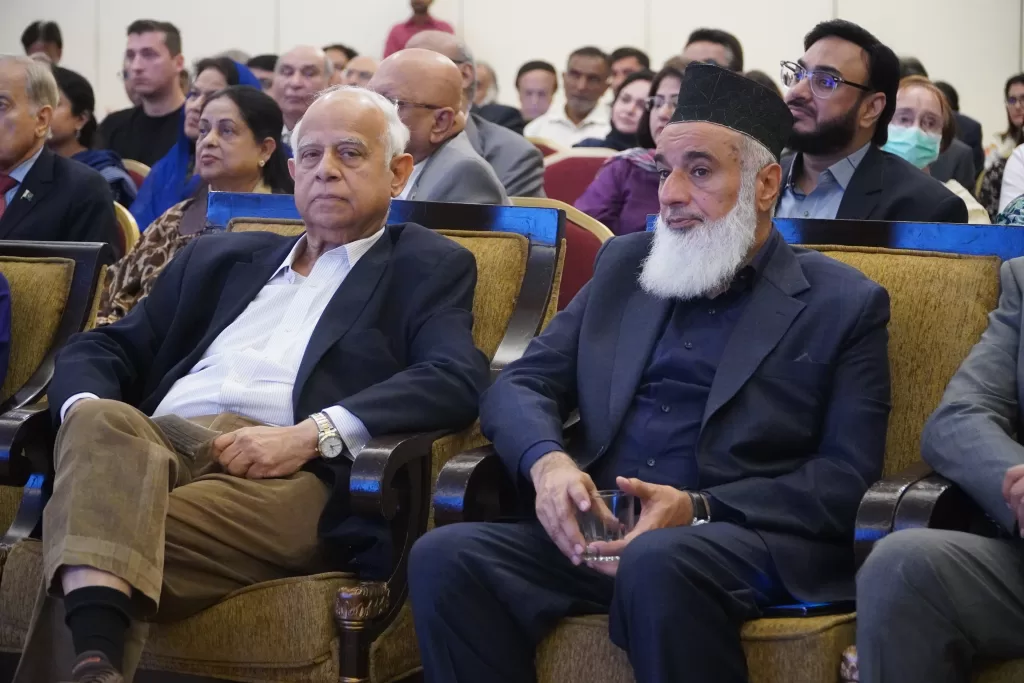
About the visa from our side, it is not completely stopped. We have been issuing visa but the process is quite cumbersome. I’m working on it and my Deputy High Commissioner in Karachi is also working on it. I have devised few mechanisms to issue visa in case of emergency and in case of necessity. Like I give an example that the examination of the Professional and Linguistic Assessments Lab (PLAB), which is the British medical registration for Pakistani students held in Dhaka twice a year, sometime in May and one in the end of the year. You perhaps know that with respect to the doctors, they’re very persuasive people. I received call from the former Foreign Minister of Pakistan that a doctor should be issued visa for this.
I had to devise a mechanism, now we don’t wait for the clearance or anything and I can issue visa to the examines with the support of Pakistan High Commission in Dhaka, one thing that I need for such a visa is a note from the Pakistan High Commission stating that these people are coming from Pakistan to appear on this examination in Dhaka and so we issue Visa on the basis of that document. I had to and I have to devise some mechanism.
A week ago, my wife received a call from a very close friend of ours, in fact they hosted us at lunch when we visited last in Dhaka and the gentleman was traveling from Jakarta. He was transiting in Kuala Lumpur and passed away there. They have a family here, so we had to issue them a visa in a day. There was one gentleman, who died in Chittagong, a member of Ismailia community, I forget the name. When his family came to me in Islamabad I immediately issued them a visa.
These are some of the situations where we can issue visas. We also resort to some persuasion to get the visa processed faster in Bangladesh when there was a normal situation in Dhaka. So this is something I personally did to help out people who are desperate to go to Bangladesh. But then again, there are people who have special reason for not issuance of visa to them. Insha Allah I can tell with confidence that the process will be simplified from our side and I’m quite sure that with the simplification of the process, it will be easier for our Pakistani friends to visit Bangladesh. At the same time, I can tell you that if it is an urgent issue, if someone really needs to go to Bangladesh either for investment or business or anything, we are there to help in issuing of visa.
When I came back to Islamabad, I was advised not to meet the business people because the only question I was going to be asked would related to visa. Everywhere I go, I’m asked this question but my assurance to the business people and others in Pakistan, that in case of urgency and emergency we can always issue visa. So even before the simplification, I’m sure that with the things settling down in our part, you know that the dust still has not settled down. So once the dust is settled down in Bangladesh, we’ll have the Visa procedure simplified. Because the biggest challenge of non-issuance of visa from our side is not for the important business people in in Pakistan because they have their contacts, they have strong connections in Bangladesh.
The challenge is that this large number of Bengali speaking people who are here, leaving their family behind in Bangladesh and working here, these people are really in difficulty going back to see their families which is also related to basic human rights, this is not right. So this must be changed. With this visa issue, I’m going to conclude here but I would like to listen from you more about what we should do to enhance not only the people- to-people contact but through enhancing people-to-people, strengthening people-to-people ties, how we can enhance friendship, collaboration and cooperation between our two countries.
Because if we collaborate together, 400 million people of almost similar faith, a similar mindset, and similar system. We follow almost a similar system and in Bangladesh everything that has been grossly done is that we have removed Pakistan and put Bangladesh there, things are almost the same. So despite this similarity, despite this commonality, we are not doing great, this is really a pity. Now is perhaps the best time to work on it.
I missed out one point which is also very important. Instead of blaming each other on social media, it can be used to promote this people-to-people contact. If small groups are formed and they start doing this collaboration, forming groups, forming forums, forming platforms, would be very useful.
This is another reason for me to be here, to revive this Pakistan-Bangladesh Friendship Forum, which was one of the very active forums between the two countries in order to have a second track platform to promote people-to-people contact. With this I would like to say thank you to Karachi Council on Foreign Relations (KCFR), for giving me this opportunity to speak out my mind.
I’ve spoken not as the Bangladesh High Commissioner, I am the Bangladesh High Commissioner but I’m also one of you. Because I know for sure that if we are together, it will be beneficial for both our countries and it will be beneficial for the people. We can share our best practices, good practices and can even collaborate in joint production of goods and then sell in the country.
Well I must touch also upon the point which was raised by the honorable Chairperson in her speech about FTA. It was from Bangladesh side that FTA has never been taken as a mechanism or tool for our trade collaboration. So far, we have signed FTA only with one country and that is Sri Lanka, this also on test basis/trial basis. Ikram Sehgal knows it very well that we are not in FTA as such, still we are getting benefits as an LDC and we’ll continue to get this benefit and special treatment until 2030. So FTA has not been a cup of tea kind of thing. FTA will not work, but we have SAFTA. Although SAARC is not functioning well but for trade, we can still use the benefits and privileges of SAFTA. What is not happening between the two countries is that this joint economic commission is not sitting together. If this joint economic commission sits and they can reduce the sensitivity list, the negative list and increase the number of preferential lists.
I once again thank Karachi Council on Foreign Relations and my friends here for patiently listening to me and I’m doubly happy today. In fact the reason I’m happier because it was supposed to be my farewell visit to Karachi but my government has asked me to stay on. So I’ll Insha Allah come back again and see you and talk to you once again.

Huma Baqai, Moderator/ Sr. Vice Chairperson, KCFR
Some of you may know I’m a boring Professor so when my student is not doing too well I say you have a lot of potential. Pakistan-Bangladesh relations have a lot of potential but I think we are at a turning point. Some great things have happened since August, since the political transition took place in Bangladesh. This was the most discussed event in Pakistan. The cup of tea kind of thing. FTA will not work, but we have SAFTA. Although SAARC is not functioning well but for trade, we can still use the benefits and privileges of SAFTA. What is not happening between the two countries is that this joint economic commission is not sitting together. If this joint economic commission sits and they can reduce the sensitivity list, the negative list and increase the number of preferential lists. I once again thank Karachi Council on Foreign Relations and my friends here for patiently listening to me and I’m doubly happy today. In fact the reason I’m happier because it was supposed to be my farewell visit to Karachi but my government has asked me to stay on. So I’ll Insha Allah come back again and see you and talk to you once again. Huma Baqai, Moderator/ Sr. Vice Chairperson, KCFR Some of you may know I’m a boring Professor so when my student is not doing too well I say you have a lot of potential. Pakistan-Bangladesh relations have a lot of potential but I think we are at a turning point. Some great things have happened since August, since the political transition took place in Bangladesh. This was the most discussed event in Pakistan. The most referred to event in debates in Pakistan and I also want to point out something that this was perhaps for the first time that a tribute event was held in Dhaka to mark Quaid-e-Azam’s death anniversary. It meant a lot to us. And with that I’m going to invite somebody who’s an author, a patriot and who has not just spoken at NDC Bangladesh, but frequently visits NDU Pakistan and is committed to Pakistan and to better relations between Pakistan and Bangladesh. Please put your hands together for Mr. Ikram Sehgal.
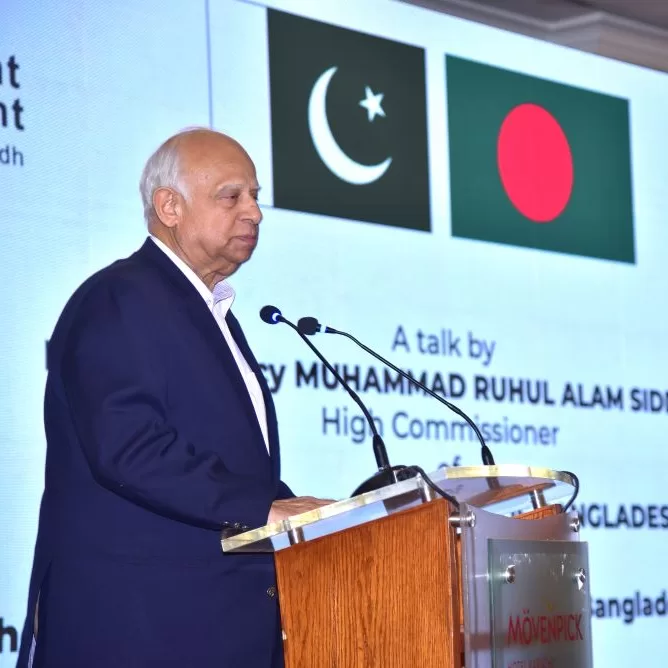
Ikram Sehgal Patron-in-Chief, KCFR
Bismillah ir Rahman ir Raheem, Assalamualiakum, Honorable High Commissioner Mr Muhammad Ruhul Alam Siddique, Mrs Siddique. Because you preferred to start off with the cooking channel, and as you know my mother was Bengali and my father was Punjabi, in that sense I’m very much well equipped to talk about Pakistan and Bangladesh.
Whenever I really feel the urge to have Bengali food, I’m grateful to Sara for giving me the opportunity to be at their house and to have Sutki fish or Potol. Thank you very much. In that sense, let me also tell you that being from Punjab and being from Bengal in Pakistan was not a very comfortable experience sometimes. Because when my younger sister who’s buried in Dhaka, and I, whenever we used to go to Dhaka we would became Punjabis and whenever we came to West Pakistan, people said they are of Bengali origin.
But for us, it was very comfortable because we were very happy and even my parents are buried here in Abdullah Shah Ghazi Mazar. But let me tell you how close this country was for us and I’ll surprise you with it. A lot of people don’t know that Zia ur Rehman’s parents are buried in Sakhi Hassan Graveyard here in Karachi.
Zia ur Rehman did his primary schooling from Karachi, he studied in DJ Government Science College Karachi and he went to the PMA from Karachi. My father, because he was in the Army and he raised the East Bengal Regiment, the second Battalion at least, and I had the honor of serving in that regiment, when I went to the regiment, my Company Commander was Zia ur Rehman. So I had a close relationship with them and it lasted till afterwards, it is a long story and I don’t want to go into it.
What I’d like to say is that I’m not from the first ones who talked about the no Visa and no Tariff policy. Let me tell you, the first person who talked about no Visa no Tariff, was General Zia ur Rehman when he visited Pakistan in 1978. He proposed this to General Zia ul Haq, no visas and no tariffs. For bureaucratic reasons that was shot down at that time, but SAARC was his brain child and it came about right and it went on. Today, I’m going to cross some diplomatic safe lines because I’m not a diplomat. But I will say this, that the High Commissioner has very correctly given a long list of the hurdles that we have to overcome for this ‘No Visas and No Tariffs’ policy. Let me tell you that there are no hurdles, just declare that there would be no Visas, no Tariffs, and no custom duty, that’s all.
You think Bangladeshis will come and stay here in Pakistan or Pakistanis will go and settle in Bangladesh if this happens? Similarly, make the Bangladeshi Taka and the Pakistani Rupee comparable, so you can buy things in Pakistani Rupees or Bangladesh Taka, simple. Actually these are not something that I’m talking about now. Unfortunately it is some coincidence that I was born in July 1946 and on July 1946, Shere-Bangla A. K. Fazlul Huq went to the Quaid-e-Azam along with Mr Huseyn Shaheed Suhrawardy and Mr Abul Hashim Khan, and proposed to the Quaid something that was after the Quaid’s heart. He said, do not divide the Punjab and do not divide Bengal.
That was a strategic move by the Quaid. The first strategic move of the Quaid was actually on 25th August 1942, when Singapore had fallen, Rommel was at the gates of Cairo, Mahatma Gandhi and the Congress said, “let the British quit India, nobody will go to the armed forces” this was on 8th August 1942, and the Quaid said on 25th August, that “no, the Muslims will go and join the Army and fight for British India because that is the way we will get our freedom” and that is what led to the British keeping to their promise of dividing India into two parts at that point of time.
The second strategic decision was that when Sher e Bangla went to the Quaid and the Quaid said “Yes, please let’s do it, let’s have the original part of the Lahore Resolution that was about two autonomous states, let’s have it”.
He said, it does not matter what we are called, we are two countries, one Nation. I didn’t say that, that was said by A. K. Fazlul Huq in 1946 and that is what the Quaid said. Mountbatten had it in his original plan, people don’t know that but unfortunately when the Congress came to know about it, they were livid. That was one strategic decision about a United Bengal.
The second strategic decision which the Quaid made was that when he went to Master Tara Singh and said, “You’re asking for Sikkhistan, please take Khalistan”. So can you imagine, if there was a Khalistan then, would you have the problem about Kashmir? Would you have the problem about India threatening us over the Indus Water Treaty? Because the waters matter much more for the survival of Pakistan. We would have no problem. And today, what is stopping us for asking for it? Because in Canada 90% of the Sikh population has voted for Khalistan and also in United States 90% of the Sikh population voted for Khalistan. So what is stopping us from saying that ‘Okay fine, have your Khalistan’, and then the Kashmir Dispute will go away by itself.
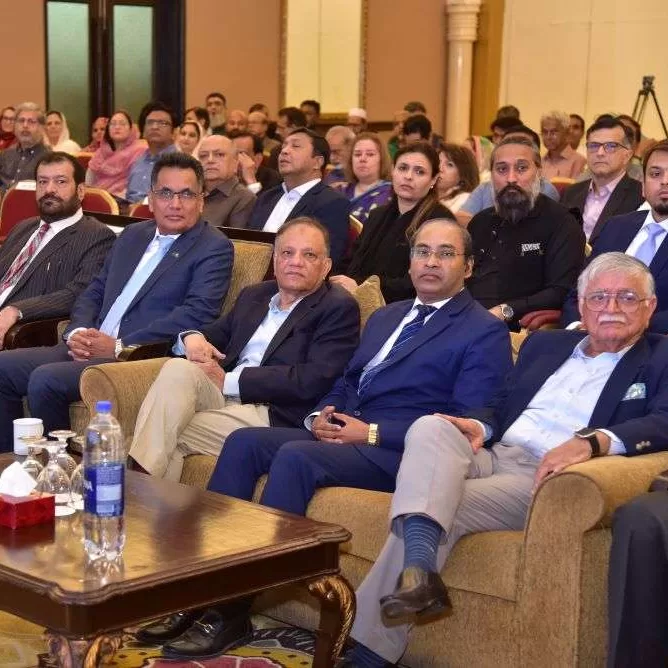
There are a lot of things one can say, but let me tell you that the High Commissioner has very nicely skirted that during Sheikh Hasina Wazed’s second tenure, her closest advisor was a gentleman called Gohar Rizvi and he and myself had started a dialogue, sanctioned on the condition of deniability by Mr Sartaj Aziz. He said let us start a back channel to see how we can close our differences. And, I will be a little undiplomatic, the High Commissioner, as Deputy Commissioner at that time, presented two of the discussions which we had at the DHA Golf Club so that nobody could record the conversation that was happening.
We were close to a solution at that time but these are missed opportunities. And now, Hasina Wazed changed during her third tenure as you heard. I used to lecture in the National Defense College but I was stopped from not only lecturing at the National Defense College but also, the High Commissioner had to, let us say, embarrassingly refuse me, not refuse me but said that “you will not be able to get a visa to for my son’s and daughter’s wedding”. But he did give a visa to my daughter who went and attended the wedding on my behalf.
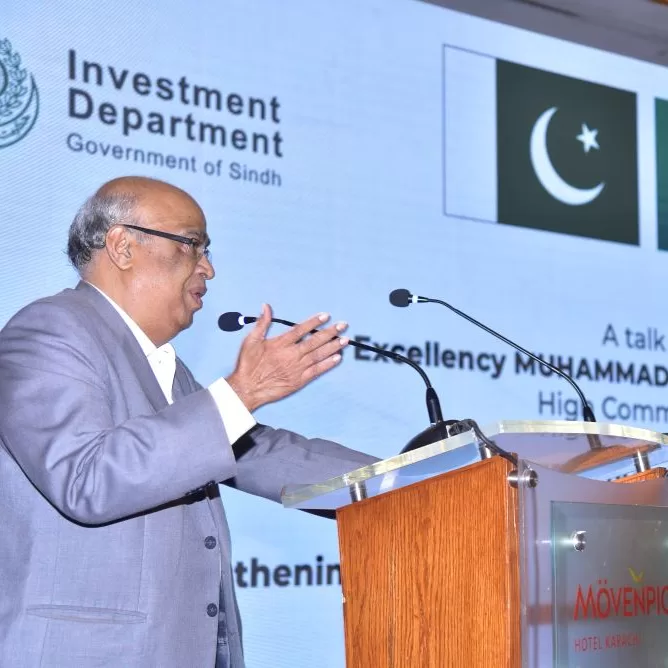
So these things have changed but let us change everything, let us really come back to the simple fact, let’s go back. Of course nobody remembers the Quaid-e-Azam now so much. The least of all, the paper that he founded in 1941 and came out in 1942, Dawn, didn’t even remember his Death Anniversary on September 11th this year. But the point is, let’s not grow memories. I don’t know the number exactly but I know that there are at least about 10 times more Bangladesh military students in Pakistan today, studying at Pakistan Army schools and other schools than Pakistani Army Officers studying there, 10 times more.
So let’s not take everything at face value. We want peace with India and it is in India’s interest to have peace with us. Because we are a strong nation and we have the Deterrence capacity. In 1971, there were three lightly armed Pakistani Army divisions, without their equipment fighting in East Pakistan. So please tell me now, when 90% of the border of Bangladesh is with India, why does Bangladesh need 10 Divisions, 10 Divisions out of which five are within 5 miles of the border? Somebody once asked me, when one of the wives of the Generals in Bangladesh Army sent me frozen cooked food, and they’re passing through to go to Kabul through Islamabad airport and my PRO was taking it out of that place and asked who is that for?
They said, this is food (fish) sent for Sahab (me) from a Bangladeshi General. And of course I was asked for a cup of tea to explain this that how come I was getting cooked food. So I explained it to him, I said, aren’t you happy that people do think about us and send us food. So relish that, relish that friendship with malice for none. Like Abraham Lincoln said, “With Malice toward none, with Charity for all.” We have no malice. Very bad things had happened in 1971 in Bangladesh, in East Pakistan. Yes it happened to the Bihari’s also. I’m a personal witness to it. I was flying a helicopter for the Commander Eastern Command and I’ve been to Parbatipur, and I’ve been to Chittagong, and I’ve been to other places where the Biharis were slaughtered at that time.
But on the other hand, something bad also happened afterwards but we cannot go back and think about those things. We have to look forward like the High Commissioner said. We have to go beyond what has to be thought about. We have to say, look at ourselves, look at our youth, what they can do.
And I tell you, there’s nobody in South Asia who can compare to the Youth of both Pakistan and Bangladesh if they come together. We can dream about a United Bengal and we can dream about Association of Western States of South Asia with Pakistan and Gilgit-Baltistan and Kashmir and Khalistan, etc.
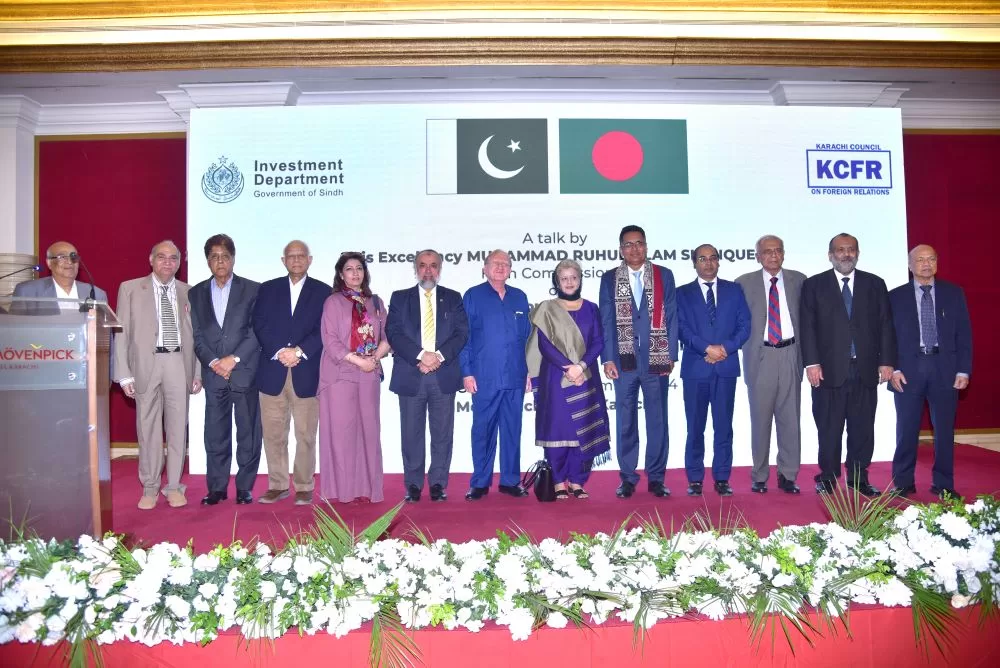
But we do not have to forget that the largest component of Muslims in the world are living in India and they’re living in awful conditions and the biggest guarantee to them is a strong Pakistan Armed Forces and a strong Bangladesh Armed Forces. This is the biggest guarantee for them. As long as they know that both these forces are strong, they are secure. Nobody wants to war but there is something known as a ‘détente’ and that gives you the détente, so that they don’t persecute people. People should be allowed to live, they may be from whatever religion like the Quaid said, whatever religion they may belong to, whatever sect they belong to, let them live with each other. I have only one other thing to say and it is about Cricket. The Bangladeshi government about 8 years ago banned flags in the cricket stadiums, and do you know why? Because they used to have Pakistani Flags when the Pakistan Cricket team used to be playing there. And if the Pakistan and Indian cricket team were playing, there were only green flags all around. So we have a lot of affinity before us, we also have a lot of hurdles to overcome. We have to forget and not exacerbate the wounds that have been inflicted upon each other.
I will take this opportunity to thank Ms. Nadra Panjwani. You have really brought KCFR to a new level and you can see it from the audience today and from the guests that we have today.
You are an amazing diplomat, as a friend of course I will say I’m biased but even when I’m biased, whenever we speak, you’re diplomatic with me also at times and I realize that. But I realize that it’s because of the professional nature of your duties. But one has to accept it.
What we require is direct flights, we need no visas, no conditions, people-to-people contact like we used to have in the old times, so that we go back to the one slogan which was said by a Bengali, Sher-e-Bangla. “Two Countries, One Nation.”


